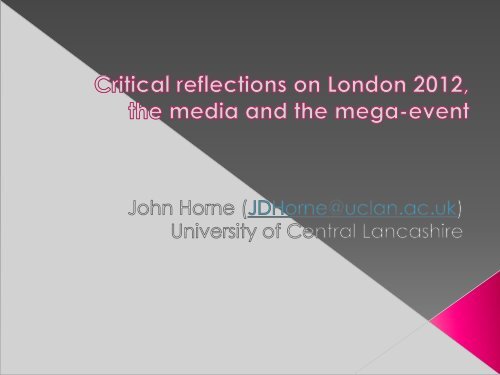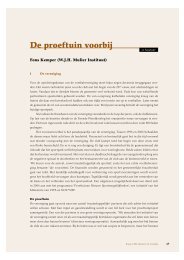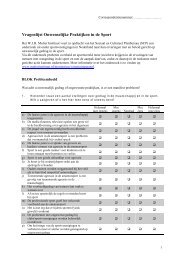The Guardian - Mulier Instituut
The Guardian - Mulier Instituut
The Guardian - Mulier Instituut
Create successful ePaper yourself
Turn your PDF publications into a flip-book with our unique Google optimized e-Paper software.
Media coverage as a site of struggle<br />
between competing groups competing<br />
to define reality<br />
Uneven power relations – resources,<br />
timing, legitimacy – a ‘hierarchy of<br />
credibility’ (Becker 1967)<br />
Sport and the rise of public relations (PR)<br />
(Boyle 2006)<br />
‘Seizing the Olympic platform’ (Price<br />
2008)
‘All Olympic Games organisers face this<br />
problem: they begin in the bright<br />
sunshine of great publicity when the bid<br />
is won, and then for the next six (or<br />
seven) years have to face a blizzard of<br />
critical coverage. Partly this is because<br />
of the old principle that bad news make<br />
bigger headlines’ (Horne & Whannel<br />
2012).
News or Entertainment<br />
News, including mega-event news, as a<br />
‘social production’ (Hall et al 1978)<br />
involving: selection, representation and<br />
meanings/ effects<br />
Broadcast Media – more celebratory<br />
Print Media – more critical (at least before<br />
‘games time’)<br />
Internet – alternative, reflecting both
<strong>The</strong> perpetual Olympic media story – an<br />
unpredictable event in a predictable<br />
time frame is the ideal news story<br />
Pre-bid, Bid, Decision, Build-up, Games<br />
Time, Post-Mortem, Legacy<br />
Elements of newsworthiness shift at<br />
different stages before, during and after<br />
‘games time’
‘In the build up to any Olympic Games the<br />
media coverage is often focused on two<br />
central questions: ‘will it go over budget’<br />
and ‘will the facilities be ready in time’ <strong>The</strong><br />
answer to both questions is usually ‘yes’ …<br />
…After the Games commence, by contrast,<br />
there is a massive turning inward of the<br />
media to events in the arena and the<br />
stadia’ (Horne & Whannel 2010).
‘<strong>The</strong> tone within the UK press…will<br />
depend on the medal count and the<br />
impact of the Coalition Government’s<br />
spending cuts…<strong>The</strong> expense of an<br />
Olympic Games must be justified by<br />
glory and, at the very least,<br />
organisational competence.<br />
Broadcasters… are inclined to<br />
exaggerate the good’ (Steen 2012)
Flag-waving fomenters of the feel good<br />
factor or dispassionate critics<br />
‘the atmosphere created on the ground by<br />
the crowd and the sense of occasion may<br />
lead to the suspension, or outright<br />
surrender, of one’s critical faculties’ (Steen<br />
2012)<br />
BBC – 2,500 hours live TV, 765 reporters<br />
Print media – ‘Leave go your cynicism and<br />
let the Games commence’ (Martin Kettle,<br />
<strong>The</strong> <strong>Guardian</strong> 26 July 2012.
British national newspapers devoted an<br />
average 46 pages daily to Olympic<br />
coverage<br />
Highest percentage of a paper<br />
committed to Olympic coverage – 65%<br />
Olympic coverage published on the<br />
front, news, sport, feature and other<br />
pages<br />
More than 7,200 pages of Olympic news<br />
published by UK national press
UK media space was saturated with<br />
Olympic coverage<br />
Created the cultural imagery of public<br />
euphoria<br />
Media processes of news selection and<br />
presentation is clear<br />
‘”boosterism will have the upper hand…No<br />
one likes a party pooper”’ (journalist<br />
Mathew Engel, cited in Steen 2012).
We don’t know that much about the cumulative effect of<br />
such media imagery<br />
<br />
‘Nobody can deny that the Olympics have inspired millions to<br />
take-up watching daytime TV on a regular basis’ (letter to <strong>The</strong><br />
<strong>Guardian</strong> 8 August, 2012)<br />
<br />
<br />
<br />
Need to find out more about:<br />
the relationship between (mediated) mega events and<br />
people’s lives<br />
how the routinization of the ‘mega-event story’ affects<br />
people’s responses to tales of suffering as well as euphoria
Howard S. Becker (1967)‘Whose Side Are We On’, Social<br />
Problems, Vol. 14 (3), pp. 239-247.<br />
Raymond Boyle (2006) Sports Journalism, Sage.<br />
Stuart Hall et al (1978) Policing the Crisis, Macmillan.<br />
John Horne & Garry Whannel (2010) ‘<strong>The</strong> “caged torch<br />
procession”: celebrities, protesters and the 2008 Olympic torch<br />
relay in London, Paris and San Francisco’, Sport in Society, Vol. 13<br />
(5), pp. 760-770.<br />
John Horne & Garry Whannel (2012) Understanding the<br />
Olympics, Routledge.<br />
Monroe Price (2008) ‘ On Seizing the Olympic Platform’, in M.<br />
Price & D. Dayan Eds. Owning the Olympics, Digital Culture<br />
Books/ University of Michigan.<br />
Rob Steen (2012) ‘<strong>The</strong> view from the press box. Rose-tinted<br />
spectacles’ in J. Sugden & A. Tomlinson Eds. Watching the<br />
Olympics, Routledge.
















